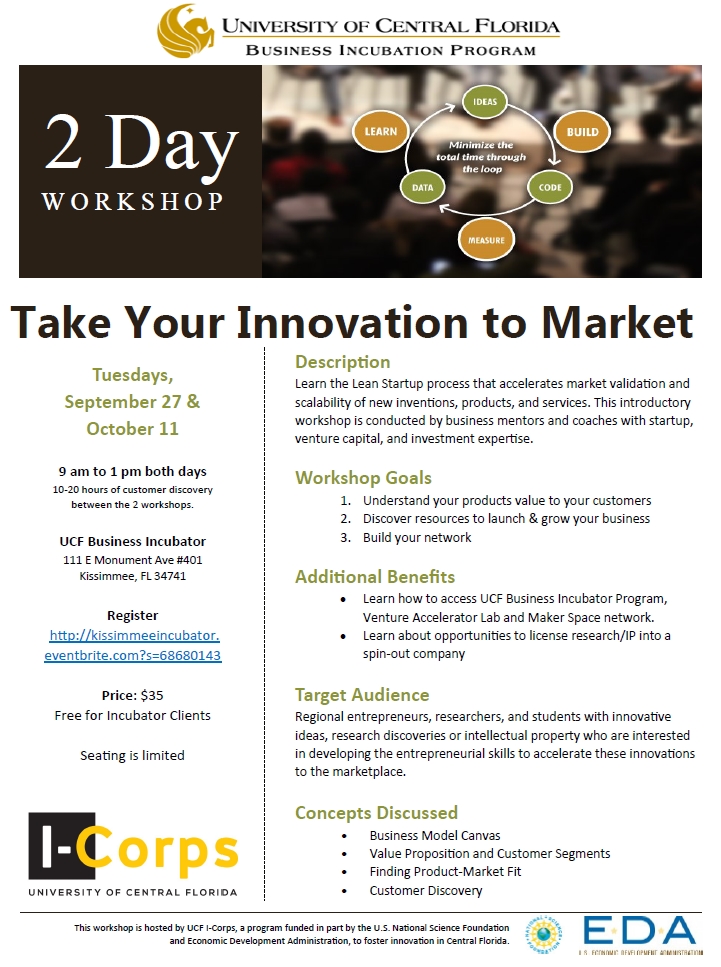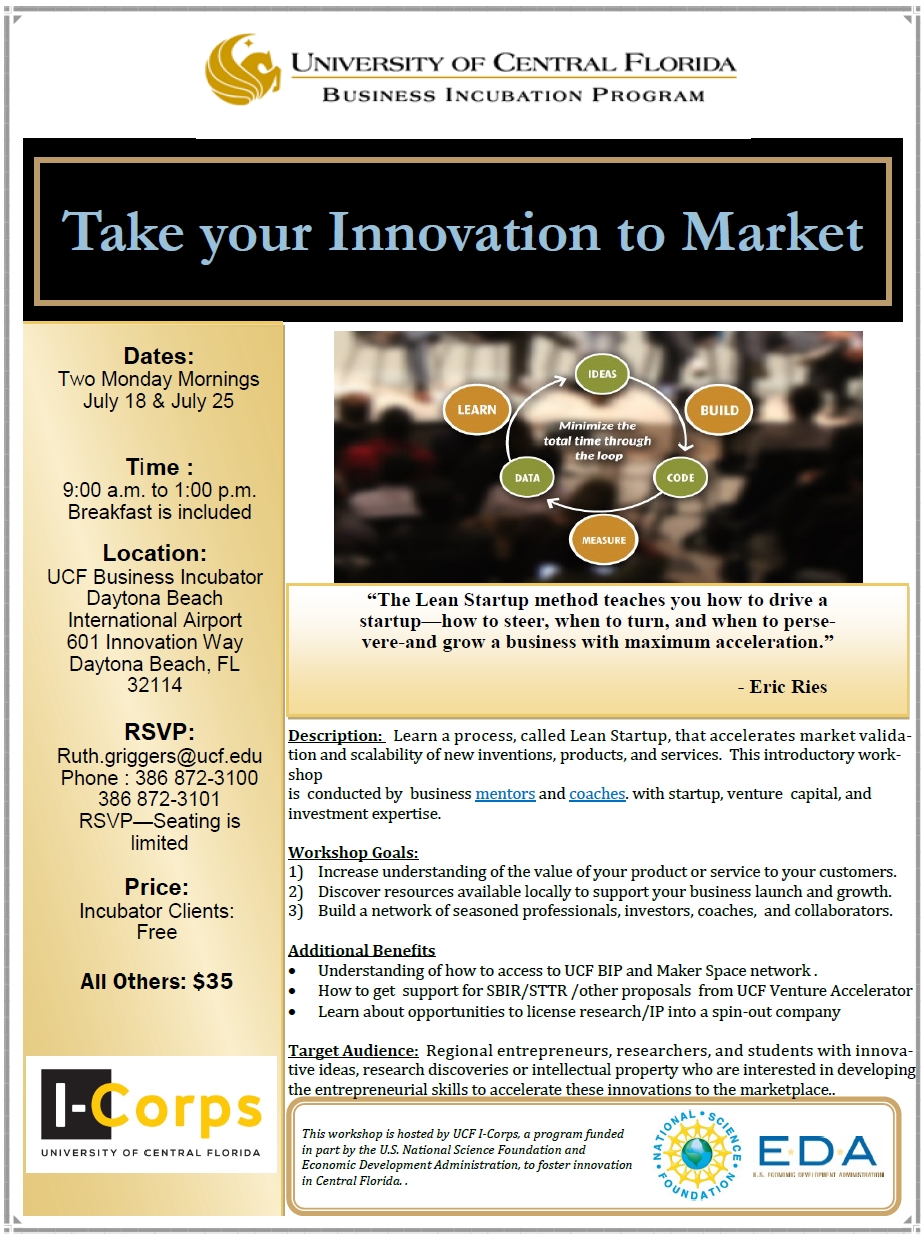What Happens to the Research?
I-Corps Teaches Teams How to Take Research to Market
Existing knowledge from patents can be used to create billion dollar businesses. Universities, like the University of Central Florida, have millions of dollars’ worth of innovative research that have yet-to-be-discovered market applications. In a Reuters article, IP analyst Bob Stembridge points out that, “Invention brings something new into being, while innovation brings something new into use. Innovation is the development of better solutions and products to address unmet market needs whilst maximizing returns for the organization.”
Taking inventions to innovation has the potential to revolutionize industries, improve standards of living and create jobs in local economies. So how can individuals explore the worth of patented research to bring innovations to market?
Let’s look at a group of student researchers at UCF who decided to patent their innovative discovery – a hydrophobic and self-cleaning nanostructure material. The team, Feynman Nano, believed that sheets of these nanostructures could be applied to solar panels to both reduce the cleaning time and increase panel efficiency. To determine if they had a viable business, the researchers participated in a program that teaches individuals how to validate their proposed market, UCF I-Corps.

UCF I-Corps is funded by the National Science Foundation (NSF) to teach the process of starting a business through the Business Model Canvas (BMC). The BMC gets rid of the traditional business plan and focuses on conducting a series of hypothesis tests to validate assumptions before building a prototype or starting a business. In turn, this reduces the risk of falling into the “valley of death,” where 90% of startups fail. A survey of failed startups conducted by Forbes determined that “42% of them identified the ‘lack of a market need for their product’ as the single biggest reason for their failure.” Learning the BMC methodology has empowered Feynman Nano to survive the valley of death through understanding what they were building and for whom, before they built it.
During the 5 week I-Corps program at UCF, the team conducted over forty face-to-face interviews to gather data and validate their assumptions on their customer segment (the group that would eventually purchase their product) and value proposition (reason for purchasing the product). After receiving feedback from potential industry customers and the I-Corps teaching team & mentors they learned that although their customers wanted the technology, they did not want to pay for them to scale. Feynman Nano then researched residential solar uses for a self-cleaning application, but found the market wasn’t sophisticated enough to know it need their product.

To better understand where the technology could be scaled, they explored different options by “pivoting” their focus to various possible applications. Since UCF I-Corps provides seed money from the NSF, they were able to attend industry-specific conferences to meet potential customers and continue their search. After several rounds of pivoting, the team settled on an anti-microbial application for preventing healthcare associated infections.
As a result of going through the UCF I-Corps program, Feynman Nano now has NSF lineage (which means they can apply for exclusive NSF grants) and a 60% increased chance of obtaining SBIR/STTR funding. Since their graduation, they have applied to the National I-Corps program, where, if accepted, they will receive $50,000 in seed funding. Feynman Nano was also accepted in to one of the most prestigious accelerators in the world with a 2% acceptance rate, Y-Combinator.
“Innovation drives the economy, but much of the new technical knowledge required for such innovation is contained only in patents. The U.S. patent database is the world’s largest encyclopedia of technology improvements and technology experts in the world.” – Jay Walker, Wired
Countless stories like this can be found and are waiting to be discovered. Between 2012 and 2014, UCF spent more than $433 million dollars in research expenditures and has hundreds of patents waiting to be tested in the market. UCF I-Corps has been proven to increase a startup’s probability of success and reduce the probability of failure. So if you either own a patented technology or are looking to license a patent to create a company, why not increase your chances of success by going through UCF I-Corps?
For more information about the I-Corps program, contact Vanessa Zabala.
Written by Vanessa Zabala
UCF I-Corps Now Accepting Applications for Spring Cohort
Scientists and Engineers Interested in Taking Ideas Beyond the Lab are Encouraged to Apply
UCF Innovation Corps (I-Corps) – an accelerated program outlining the most important first steps in developing a business around research and ideas –is actively seeking scientists and engineers from universities and research centers from around the state. I-Corps teams generally consist of an Entrepreneurial Lead (EL), Principal Investigator (PI) and Industry/I-Corps Mentor. The 2016 recruitment schedule is as follows:
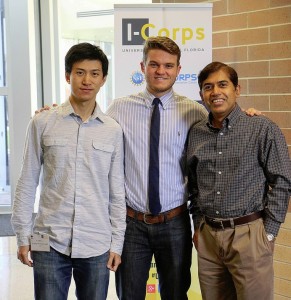
Capacitech (Cohort 3) utilizes nanoscale materials to develop a coaxial cable with supercapacitors. Pictured from left to right: UCF PhD student Chao Li and undergraduate student Joe Sleppy (Entrepreneurial Team Leads); Dr. Jayan Thomas, UCF Nanoscience Technology Center (Academic Team Leader). Not pictured: Dr. Greg Howes, President & CEO of Treaty Consulting Group, (Team Mentor).
I-Corps – UCF Site Cohort 5
Wednesday, May 4, 2016 @10am – Application Deadline
Friday, May 13, 2016 – Start of UCF Site Cohort 5
I-Corps – UCF Site Cohort 6
Wednesday, August 3, 2016 @10am – Application Deadline
Friday, August 12, 2016 – Start of UCF Site Cohort 6
I-Corps – UCF Site Cohort 7
Friday, September 30, 2016 @10am – Application Deadline
Friday, October 14, 2016 – Start of UCF Site Cohort 7
The I-Corps program provides aspiring entrepreneurs with an immersive, hands-on curriculum designed to teach them how to test their ideas, gauge feasibility, understand consumer demand, examine competition and develop mutually beneficial partnerships to help transition their ideas into profitable enterprises. Experienced advisors and mentors oversee the teams and coach them toward success.
“I-Corps is designed to help student and faculty researchers turn their innovations into potential business opportunities using the proven National Science Foundation (NSF) I-Corps model,” says Kapono Curry, program director for UCF I-Corps. “The previous cohorts made excellent progress toward commercializing their ideas. We look forward to seeing what the 2016 teams have to offer.”
In addition to the standard curriculum, Cohort 4 selectees have the opportunity to hear from teams, mentors and members of the teaching teams from past cohorts. Once teams complete the UCF I-Corps program, the path to commercial market continues with opportunities for funding in NSF’s national
I-Corps program and SBIR/STTR grant funding. Teams are also able to tap into the entrepreneurial ecosystem within UCF and the community.
UCF’s nationally certified teaching team is comprised of a diverse mix of experienced entrepreneurs, investors and UCF faculty including Thomas O’Neal, Oscar Rodriguez, Michael O’Donnell, Cameron Ford, Ivan Garibay and David Metcalf. The UCF I-Corps teaching team earned its certification via the training and support of Jerry Engel, a professor at Berkeley (University of California), National Faculty Director of the NSF I-Corps program and co-creator of the Lean Launchpad methodology and curriculum.
For more information, please contact Vanessa Zabala at vz@ucf.edu.
UCF “Smartphone Drug Test” Team Selected for Prestigious NSF National I-Corps Program
Team’s Leader Also is UCF’s First to Earn NIJ STEM Fellowship
UCF graduate student David Nash and his team are developing a smartphone-based handheld drug test system for law enforcement applications. The team has been selected to further advance their innovation at the national level through the National Science Foundation (NSF) I-Corps program. The team was part of the first cohort to participate in UCF’s I-Corps program.
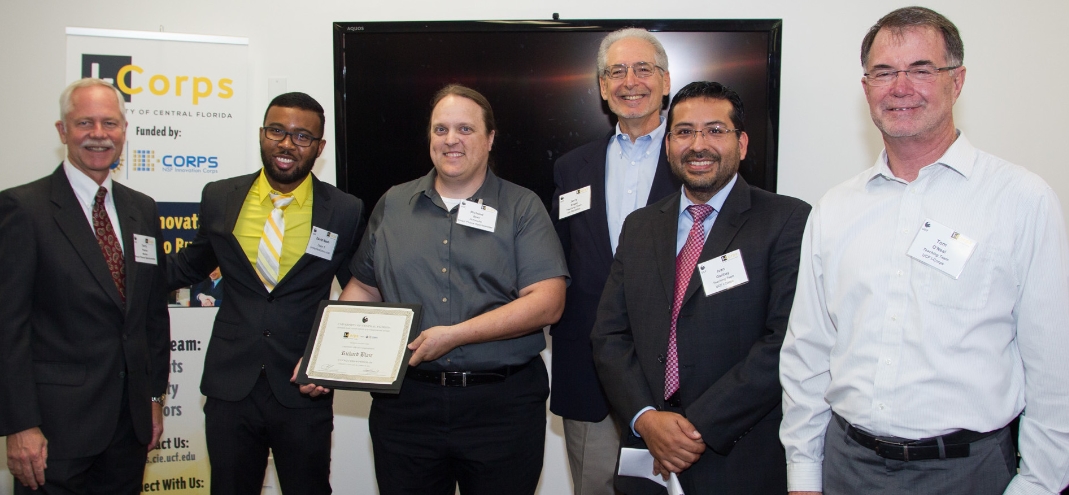
UCF’s “smartphone drug test” I-Corps team (from left to right) -Terry Pierce, industry expert and team mentor, David Nash, UCF graduate student and the team’s entrepreneurial lead, Richard Blair, Ph.D., UCF Physics Department and CATER professor and the team’s principal investigator, along with Jerry Engel, co-founder and leader of the Lean Startup movement, Ivan Garibay, Ph.D., program director, UCF I-Corps Site and Tom O’Neal, Ph.D., executive director, UCF I-Corps Site and associate vice president, UCF’s Office of Research & Commercialization.
With its participation in the national program starting in January, the team will continue to receive expert guidance and a $50,000 grant in support to further develop and refine their technology, and to conduct market, and customer validation. In addition, Nash, a Ph.D. student in chemistry, also recently earned the university’s first National Institute of Justice (NIJ) Graduate Research Fellowship in Science, Technology, Engineering and Mathematics award of $50,000 to fund continued work on a prototype.
The NIJ is the research-funding branch of the Department of Justice. Annually, it provides a monetary award to a handful of graduate students to conduct research in the social or physical science fields that will help the criminal justice, law enforcement, or forensic communities.
“Our participation in the national NSF I-Corps program and the recent NIJ funding will allow us to greatly propel the development of the technology and the law enforcement community’s awareness of this capability,” said Nash. “It’s an outstanding opportunity and we’re committed to make the most of it.”
The UCF “smartphone drug test” I-Corps team—which includes Nash as its Entrepreneurial Lead, UCF Physics Department and CATER professor Richard Blair, Ph.D. as its Principal Investigator, and Terry Pierce, who with more than three decades of corporate experience in business development and product management acts as its Mentor—are developing a system that leverages spectrometry, smartphone and cloud technologies to allow law enforcement and forensic analysts to rapidly, accurately and safely identify substances of abuse in the field.
In a typical field situation, law enforcement professionals who need to determine the identity of an unknown substance often must conduct a complex and multi-step process utilizing caustic chemicals to appropriately handle and gather the substance, perform the testing and visually interpret the results.
With the team’s smartphone spectrometer system, the law enforcement professional introduces a tiny sample of the unknown substance into a handheld spectrometer. The spectrometer features luminescence technology which measures a unique signature of the substance. The smartphone’s camera is used to take a photo of this image which is then analyzed via an app, developed by the team, which digitizes the image and compares it with a cloud-based reference data library, providing the identity of the substance to the smartphone screen within seconds. In addition to law enforcement, this analytical technology can be used in a variety of forensics, military and other field-test applications.
“We’re digitizing what traditionally has been an analog methodology,” explained Nash. “We expect our technology will increase the speed and accuracy of field tests in analyzing the identity of unknown substances, help reduce false positives and false negatives, and give law enforcement a tool for enhancing the pace of the prosecution process. In addition, we will be accumulating a database that, through big data analytics, will offer law enforcement local, regional and national data on criminal activity associated with substances of abuse.”
The team is engaging with several Florida-based law enforcement agencies as well as other law enforcement agencies throughout the country to test the system. Nash anticipates that a beta version of the system will be available early next year.
“The positive trajectory underway for David and his team really epitomizes the benefits of the I-Corps program and its success in fostering innovation among faculty and students,” said Tom O’Neal, Ph.D., executive director for the UCF I-Corps Site and associate vice president, UCF’s Office of Research & Commercialization. “It’s an immersive, hands-on program that connects these teams with appropriate advisors and mentors and is designed to teach the teams how to test their ideas, identify potential customers and markets, and transition their ideas into profitable enterprises. It works and that is why we do it.”
###
About UCF I-Corps
The University of Central Florida (UCF) has partnered with the National Science Foundation (NSF) to deliver one of the agency’s flagship programs as an I-Corps Site. The I-Corps Site’s purpose is to foster innovation among faculty, students, and local entrepreneurs, to nurture and support them as teams to transition their ideas, devices, processes or other intellectual activities into the marketplace. The UCF sites program is part of a national innovation network consisting of 37 universities nationwide. The primary goal of NSF I-Corps is to provide university scientists and researchers the program, process, and resources to investigate and validate the commercialization potential of their science to benefit society. For details visit ICorps.cie.ucf.edu.
Building Momentum from I-Corps to the Commercial Market: Talon Simulations Sells Its Full Motion Simulators
 Distinguished as one of the first cohorts in UCF’s inaugural I-Corps program, Talon Simulations has successfully transitioned from the Lean LaunchPad program to commercialization. Led by graduate student Brandon Naids, Talon has been recognized for its Atomic A3 Full Motion Simulator, which is for sale to customers worldwide.
Distinguished as one of the first cohorts in UCF’s inaugural I-Corps program, Talon Simulations has successfully transitioned from the Lean LaunchPad program to commercialization. Led by graduate student Brandon Naids, Talon has been recognized for its Atomic A3 Full Motion Simulator, which is for sale to customers worldwide.
Talon recently entered into an agreement with U.K.-based Atomic Motion Systems, which is handling product development and manufacturing. Talon’s Atomic A3 Full Motion Simulator is available as a racing/flight system, hands-on throttle and stick jet system and passenger/ride system. All simulators are packaged with Simphynity motion extraction software with over 100 supported games and Oculus Rift virtual reality headset support.
“Partnering with Atomic Motion Systems was the right fit and the right time for us,” says Naids. “They have great manufacturing capabilities and proven reliability. The relationship allowed us to immediately enter the market.”
Through their I-Corps participation, Naids and his Talon team worked to develop an in-flight training simulator that bridged the gap between expensive, bulky modules and those that are cheaper, static and of lower quality. Their focus was to develop an immersive, affordable and effective flight training simulator. The simulator has received accolades from flight instructors as well as commercial and military pilots during initial demonstrations.
Thanks to its use of flight simulation software, precision motion control and a 360-degree head-tracking virtual reality display, Talon’s simulator provides a reduction in the motion sickness that can occur from this type of simulation training.
“Talon Simulations began with a vision and a passion to revolutionize how pilots learn to fly,” explains Naids, who credits the UCF I-Corps program with providing his team with crucial business knowledge and market intelligence. “The UCF I-Corps program helped launch us down the path of commercialization that we’re following today.”
To learn more, visit TalonSimulations.com.
UCF I-Corps Announces Third Cohort
Nine Entrepreneurial Teams Selected
Representing Cross Section of University Programs
(ORLANDO, Fla) – Nine teams were chosen by the University of Central Florida (UCF) I-Corps selection panel, as part of its activities that support the Florida Innovation Network, to move research discoveries out of university labs and into the marketplace.
Created by the National Science Foundation (NSF), the Innovation (I-Corps) is an important economic development initiative that identifies university researchers, and provides them mentoring and startup funding, to connect research into emerging products and services that benefit societal needs.
The third class (cohort) represents a cross section of students from various UCF programs ranging from entertainment media, nanoscience, virtual simulation, communications, political science, as well as modeling and simulation.

I-Corps Selection Panel selects cohort 3 teams. Panel consists of (from left to right): Tom O’Neal, Phil Dumas, George Gramatikas, Oscar Rodriguez, Ben Patz, Michael O’Donnell and Ivan Garibay.
Selected teams include:
- UTA SiM – developing a simulation-based tool that allows for fast, easy and automated construction of simulation models from a spreadsheet.
- Wear Lab – developing a vibro-tactile belt that facilitates safe, efficient, urban navigation for visually impaired and complements existing technologies.
- Bygshift – developing an app to bridge information gap faced by transfer students.
- Safety Simulations – developing a 3 dimensional virtual simulation for safety that can be used by any industry for safety training.
- Diversity & Intercultural Communication Training – developing a simulation based intercultural and diversity training.
- AR Enhanced Playing Cards – developing a procedural/process based training tool available on demand.
- Capacitech – utilizing nanoscale materials to design and develop coaxial cable incorporated with supercapacitors.
- Wind Swarm – developing a reliable, low to no maintenance, durable anemometer system with no moving parts.
- iMyth – developing an interactive program, theme-world engine, to provide an enhanced entertainment and immersive experience to customers.
The UCF I-Corps program provides aspiring entrepreneurs with an immersive, hands-on program designed to teach them how to test their ideas, gauge feasibility, understand consumer demand, examine competition and develop mutually beneficial partnerships to help transition their ideas into profitable enterprises. Experienced advisors and mentors oversee the teams and coach them toward success.
“We thought we were brilliant and knew everything we needed to know to succeed, but the I-Corps program made us realize that we didn’t know enough. Throughout the weeks we learned a lot of valuable lessons, as our instructors provided us with the keys to discover our potential and go on to start and grow a successful company,” says David Nash of Smartphone Spectrometer (cohort 1).
Ivan Garibay, Ph.D., serves as Program Director for UCF I-Corps. Dr. Garibay said, “UCF’s I-Corps program is a collaborative effort to advance innovative projects with the potential to create new products, companies and jobs within the state. It serves as a key economic engine in the entrepreneurial ecosystem.”
For more information about UCF I-Corps, please contact us.
UCF Awarded Federal Grants to Expand Entrepreneurship Outreach in Central Florida
Community Partners Rally to Generate $1.5 Million in Matching Funding to Foster Culture of Innovation throughout Region
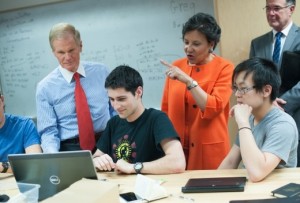
U.S. Sen. Bill Nelson and Secretary of Commerce Penny Pritzker announce funding two initiatives that will advance innovation and capacity-building activities in regions across the country.
Gaining momentum for its continued leadership in innovation and commercialization, UCF was awarded two federal grants totaling up to $750,000 from the U.S. Economic Development Administration’s (EDA) Office of Innovation and Entrepreneurship (OIE). The College of Engineering and Computer Science (CECS) and community partners raised an additional $750,000 in matching funds to supplement the EDA grants. These partners include: Harris Corporation, City of Orlando, Crossroads Investors, Canvs, Rollins College College, Starter Studio, Creative Village Orlando and others. This represents $1.5 million to help foster the culture of innovation throughout the central Florida region.
U.S. Secretary Penny Pritzker came to UCF during a press conference to make the exciting announcement last week, as part of the 2014 Regional Innovation Strategies (RIS) program grants.
UCF was one of 24 institutions to receive RIS program funding, which is a new initiative designed to advance innovation and capacity-building activities in regions across the country, and one of only two universities to earn both an i6 Challenge Grant and a Cluster Grant for Seed Capital Funds.
i6 Challenge funds
The i6 Challenge was launched in 2010 as part of the Startup America Initiative and is now in its fourth iteration. i6 is a national competition that makes small, targeted, high-impact investments to support startup creation, innovation, and commercialization. Now that the i6 Challenge is included in the new Regional Innovation Strategies Program, the funding will support more than just Proof-of-Concept Centers. Investments will also go toward the expansion of existing centers and in later-stage Commercialization Centers, which help innovators fine tune and scale their innovations to bring new products and services to the market. The total amount of funding for the i6 Challenge under RIS is nearly $8 million.
The i6 Challenge funds will be used to extend the UCF I-Corps pilot program across the five economically challenged central Florida counties (Orange, Seminole, Osceola, Brevard and Volusia), and to help transition the region’s engineering workforce into high growth technology companies that design, manufacture, and export innovative products through the Maker Spaces Proof Of Concept Center (POCC).
This Center will also leverage both the statewide Florida Cleantech Accelerator Network (FL-CAN, which was created through a former i6 grant) and the Osceola County Advanced Materials Research Center once it is opened.
StarterCorps Fund The Starter Corps Fund will directly address the critical gap in seed funding that is the largest barrier faced by the region’s technology entrepreneurs. The same five counties referenced above will be directly served by the StarterCorps Seed Fund. UCF will set up the StarterCorps fund structure, in the first six months, raise a minimum of $1,000,000, which is enough to fund 12 companies through the first year. Ultimately it will raise, deploy, and manage a $5 million evergreen StarterCorps Seed Fund to launch innovative technology and advanced manufacturing startups based in central Florida.
StarterCorps’s evergreen fund structure means all investment profits will be returned to the fund to be redeployed in future
investments. StarterCorps will provide equity-based funding in a series of milestone-based investments. Milestones will be based on a team’s aggressive progress in transforming commercially viable prototypes (which were developed in Starter Studio and I-Corps programs) into viable technology companies that gain early market traction, have a complete founding team (business and technical skills), secure IP, and can prove they are addressing an urgent market opportunity.
“The StarterCorps Seed Fund addresses the funding gap by developing stronger teams prepared for Angel investment, said Michael O’Donnell, founder of the Florida Angel Nexus CEO and executive director of the UCF Center for Innovation and Entrepreneurship (CIE).
“We want to ensure that all entrepreneurs have access to the tools they need to move their ideas and inventions from idea to market. The Regional Innovation Strategies Program competition is designed to advance this mission across the United States, strengthening our economy and our global competitiveness,” said Secretary Pritzker.
UCF I-Corps helps teams of innovators go through all the necessary steps before taking an item to market and uses the UCF College of Engineering and Computer Science’s new Maker SpaceLab Complex, created with generous industry partners to help them through idea, design and prototyping. Thomas O’Neal, director of UCF’s CIE estimates that in the fifth year of the program 195 companies will be created producing 1,730 new high-wage jobs through these teams.
“The UCF Engineering Maker Spaces have already proven their value for our students in developing prototypes and testing ideas. These grants will enable us to provide this value to more students and to the community,” said Michael Georgiopoulos, Dean of UCF’s CECS.
“We are working with regional community partners and industry to make Central Florida an epicenter for innovation, technology, and entrepreneurship. These grants will enhance our ability to help more future entrepreneurs across five counties. The awards are a validation and recognition of the Central Florida ecosystem and UCF’s role as the partnership university,” said O’Neal.
More information about the Regional Innovation Strategies Program, including a full list of the 2014 grant recipients, can be found by clicking this link.
The Innovator Newsletter, Winter 2014
A newsletter showcasing news, highlights and partners involved in the innovation and entrepreneurial ecosystem at the University of Central Florida.

